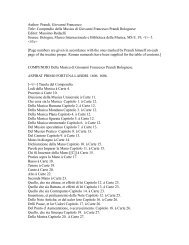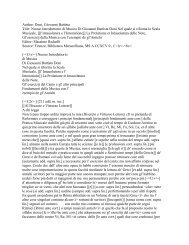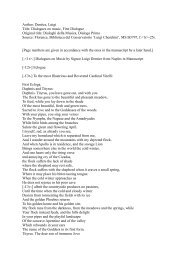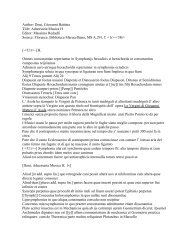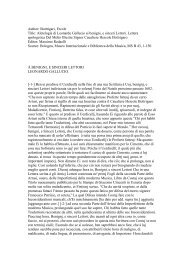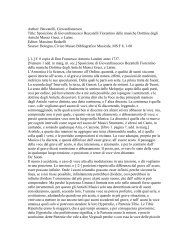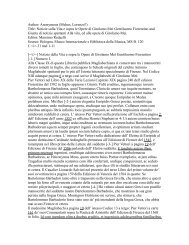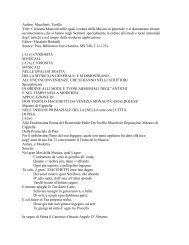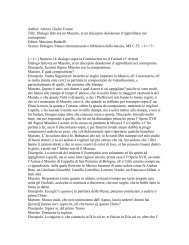Author: Doni, Giovanni Battista - manuscripts of italian music theory ...
Author: Doni, Giovanni Battista - manuscripts of italian music theory ...
Author: Doni, Giovanni Battista - manuscripts of italian music theory ...
You also want an ePaper? Increase the reach of your titles
YUMPU automatically turns print PDFs into web optimized ePapers that Google loves.
was invented after the Chromatic. He imagines that there were three people named<br />
Olympus, and that this Invention was due to the third one, but Plutarch only names<br />
two, to the younger <strong>of</strong> whom, who, he says, was <strong>of</strong> Phrygian origin and also the first<br />
flautist, he ascribes that invention on the reports <strong>of</strong> ancient writers and <strong>of</strong> Aristoxenus<br />
himself. So shed some light onto this, let us consider something more important about<br />
these two people called Olympus. Alexander, who wrote a collection <strong>of</strong> facts on<br />
Phrygia and is quoted by Plutarch himself, reports that Olympus was the first one who<br />
imported the Crumati into Greece, namely, the sound <strong>of</strong> percussion instruments (since<br />
here the word [kroumata] does not mean ‘the plucking <strong>of</strong> a string’ as the translator<br />
intended, although Suda said <strong>of</strong> him that he had been [hegemon te genomenos tes<br />
kroumatikes mousikes tes dia ton aulon], namely, that “he became the leader <strong>of</strong> the<br />
percussive <strong>music</strong> <strong>of</strong> <strong>music</strong> for the flute) and <strong>of</strong> the Dactylic ones” and that Hyagnis<br />
was the first flute player, then Marsyas, his son, and then Olympus who, as one can<br />
gather from these words <strong>of</strong> Plutarch, was Marsyas’ son. In that passage, he also writes<br />
that someone called Olympus created a Nomos, which was called Polykephales, for<br />
flute, namely, an Air for flute to be played at the sacrifices in honour <strong>of</strong> Apollo, which<br />
as called [Polykephale] exactly because [--] it was divided into many sections<br />
or passages, and that this man descended from the first Olympus, pupil <strong>of</strong> Marsyas,<br />
who composed the Nomoi or the sacred Airs about the Gods. In fact, he was loved so<br />
much by his Teacher, that he learned from him the art <strong>of</strong> the flute, he established the<br />
Enharmonic Nomoi in Greece, which were still used in his time by the Greeks in their<br />
celebrations <strong>of</strong> the Gods, that others thought that Grates, pupil <strong>of</strong> Olympus, was the<br />
author <strong>of</strong> that Nomos, which Pratinas ascribed to the younger Olympus, while the<br />
Nomos Naumatios was believed to have been composed by the first Olympus, pupil<br />
<strong>of</strong> Marsyas. I wanted to report all this because, since Plutarch is a very accurate<br />
writer, if ever there was one, and one should not believe that he made a mistake.<br />
Therefore, one can see that the man called Olympus who imported the [kroumata] into<br />
Greece is the same as the son <strong>of</strong> Marsyas, although he is mentioned in that passage<br />
before Marsyas and Hyagnis, his father and his grandfather, as the fact that he taught<br />
the Greeks the art <strong>of</strong> the [Kroumata] or <strong>of</strong> the cymbals, castanets and similar<br />
instruments is not in contradiction with his practising the art <strong>of</strong> the flute, because in<br />
those ancient times not only among the Greeks, but also among the Jews, those two<br />
types were used in combination with each other. Therefore, there are only two people<br />
called Olympus, rather than three as Zarlino suspected, as, otherwise, Pratinas himself<br />
would have mentioned the three <strong>of</strong> them and he would not have referred simply to the<br />
younger. It is true, however, that Suda as well writes that there had been two people<br />
called Olympus who played the flute, but the first one was born in Mysia and the<br />
second one was born in Phrygia, but Plutarch’s authority, which is <strong>of</strong> a different<br />
degree <strong>of</strong> judgement and knowledge, [--] from whom we know that they<br />
belonged both to the same nation, or rather, to the same family. However, it is possible<br />
that Suda found that an Olympus from Mysia, who was also flutist, existed from some<br />
other author (unless he misunderstood Plutarch), since Mysia and Phrygia are not very<br />
far from each other and the populations, who both used this type <strong>of</strong> <strong>music</strong> in<br />
abundance, were not very different, so that many details which were ascribed by a<br />
writer to Olympus from Phrygia would be ascribed by another one to Olympus from<br />
Mysia.<br />
[--] How the Chromatic and Enharmonic Genus was found and on which<br />
occasion.


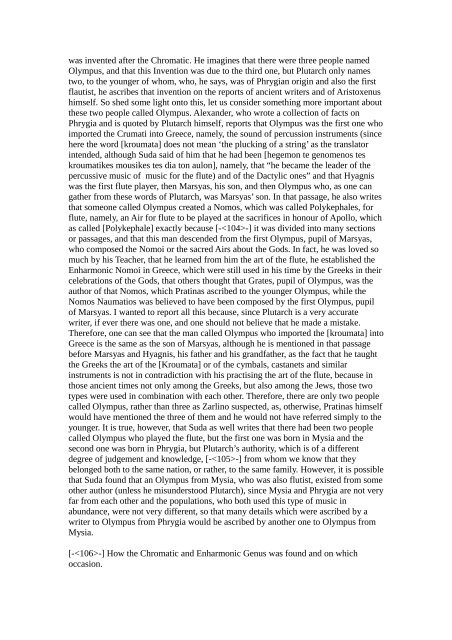
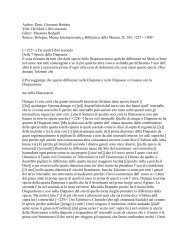
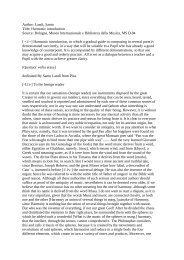
![Doni, Giovanni Battista Title: Trattato Dei Tuoni o [[Harmonie de]]](https://img.yumpu.com/45461005/1/190x245/doni-giovanni-battista-title-trattato-dei-tuoni-o-harmonie-de.jpg?quality=85)
